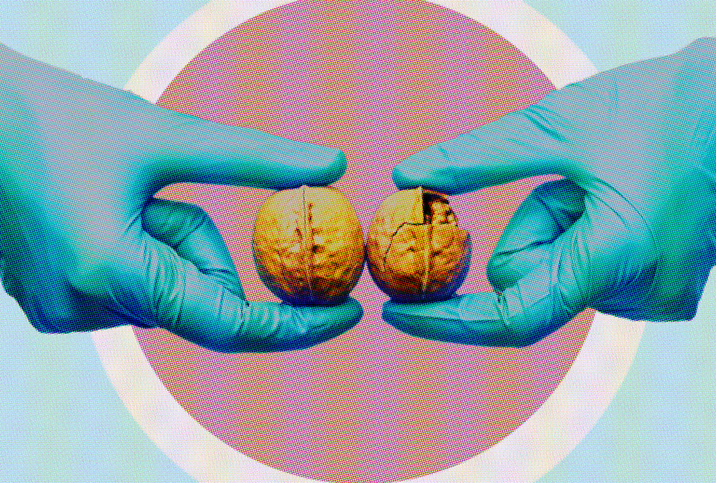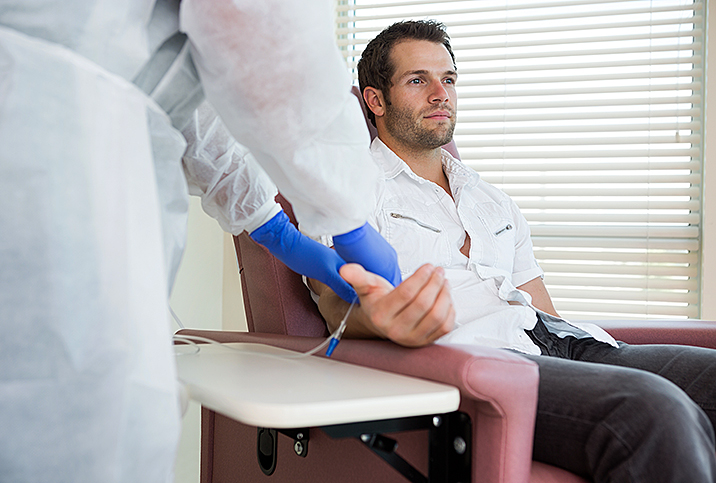A Partner's Guide to Testicular Cancer

Testicular cancer may be one of the most survivable forms of the disease—the lifetime risk of dying from it is just 1 in 5,000—but it can be devastating nevertheless.
Since the men most likely to be affected by testicular cancer are overwhelmingly young, with the average age at diagnosis being 33, a partner may not be as mentally prepared or experienced as an older person to care for someone recovering from a major illness. It's a learning curve for everyone involved.
Here's a brief guide on how you can best support your partner through their journey with testicular cancer.
Before diagnosis
Apart from your partner, you are probably the person who is most familiar with the appearance of their genitals. If you notice one testicle is significantly larger than the other or you feel a lump, speak up—perhaps not in the heat of the moment, but at a later appropriate time.
Bearing in mind the (often true) stereotype that men can be reluctant to see a doctor, it's often a push from a partner that leads to a testicular cancer diagnosis. A quick comment or pointing out a lump you felt could encourage your partner to perform a self-exam and make a doctor's appointment that could save their life.
Before treatment
A diagnosis of testicular cancer will likely cause your partner to be scared and nervous. Body image issues may arise, along with insecurities about masculinity. You can take steps to be supportive.
Be with him
A cancer diagnosis is bad enough, but when it involves a body part so associated with manhood, don't be surprised by an added layer of psychological trauma. You can offer your guy support by making yourself available to talk about what's coming and working through the doubts and fears together.
Outside support
A younger person who has been diagnosed with cancer in the prime of their life can feel tremendously isolated. Still, support groups and therapy can help, even if meetings are restricted to Zoom calls in the COVID-19 era. Since your partner is likely to have a lot on their mind, you can help by finding a group or a therapist specializing in testicular cancer issues.
Talk about sex
An open discussion about sex, either one on one or talking together with the doctor about how treatment will impact sex drive, can help alleviate your partner's concerns. As testicular cancer may impact fertility, you might want to talk about freezing sperm just in case, even if children are years down the line. You can also discuss what might change if your partner has one or both testicles removed and how testosterone therapy and other postsurgical treatment can ensure a healthy sex life.
After treatment
Whether a patient asks for it or not, they're going to need some help in the recovery phase. You can do a few tasks that your partner might not think about or realize they need.
Cleanliness
If your partner undergoes chemotherapy, the immune system is going to be severely compromised. You can provide care by keeping their living space sanitary, using antibacterial soap and hand sanitizer, limiting how many people visit, and keeping a close eye on the sanitary practices of guests.
Dietary changes
Testicular cancer treatment can impact the survivor's weight, appetite, sense of taste and ability to enjoy food. You can help by making sure your partner stays hydrated and creating meals they can tolerate to maintain a healthy weight. Be sure to consult the doctor on any possible dietary restrictions.
Take notes
It's hard to imagine the whirlwind inside a person's mind when they've been diagnosed with cancer. You can be a supportive partner by taking an active role in treatment and record-keeping. Take meticulous notes at doctor appointments and develop open lines of communication with the doctor's office for questions that will no doubt come up. You can also relieve some of your guy's burdens by keeping insurance and billing information straight.
Check in frequently
While you may be apt to jump in and help as much as possible with your partner, make sure you're not overstepping your bounds. Once a week, make time to ask your partner what they need from you. Perhaps all they'd like is a moment of distraction from treatment.
A cancer diagnosis is a lot for anyone to manage. When that cancer diagnosis may affect a man's sexuality in the prime of his life, it's a potentially devastating time. But as the partner of a man facing testicular cancer, just listening and offering a shoulder to lean on can go a long way. By taking a few proactive steps, you can help ensure that your guy comes out the other side healthy and excited to move on with life.


















